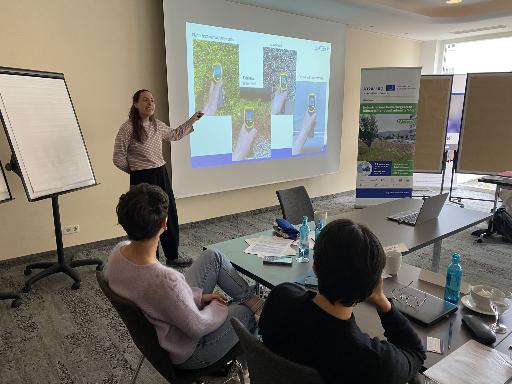As part of IB-Green’s second pilot action, three municipalities are engaging in activities to trigger private business owners to implement climate adaptation measures: The municipality of Leeuwarden and Arnhem (both NL) and the municipality of Singen/Hohentwiel (DE). The tasks include for instance having a municipal green coach to guide private businesses in the business park Hemrik on how to implement greening measures (Leeuwarden). In Singen (Hohentwiel), the municipality wants to advise several pilot companies of different sizes, e.g. on available technical and planning support, but also on existing funding options.
 Photo © Climate Alliance: Alena Hayer, Municipality of Singen (in front of the room)
Photo © Climate Alliance: Alena Hayer, Municipality of Singen (in front of the room)
In order to help other municipalities on how to get started and approach companies, we have collected advice from Niek Smits (municipality of Leeuwarden) and Alena Hayer (municipality of Singen/Hohentwiel), on what has made the difference in their eyes in consultations with companies and what challenges still remain for implementing green-blue infrastructure on private grounds.
What are you doing with IB-Green (as part of pilot action 2) to trigger entrepreneurs to implement climate adaptation measures?
We created informative flyers and worked closely with the mayor and the economic development department, who act as strong ambassadors for the topic. Their support helps build trust and reach local businesses more effectively.
We organized an event on the business park in
collaboration with the business association. During this event, we provided
information on climate adaptation and hired a nature guide to give an excursion
on the site. In addition, several actions are being prepared, such as a joint
tree planting day in winter, a “green coach” programme for businesses, and a
menu of possible measures.
What is an experience
that you have made in direct contact or in consultants with companies?
One
important experience is that it’s crucial not
to expect full commitment right away. It's more effective to first reduce
hesitation and familiarize businesses with the topic. I often suggest synergy
projects—for example, integrating climate adaptation when renovation work is
already planned. It's also helpful to address
specific vulnerabilities, such as asking if the company has experienced
heat problems in offices or production areas, or whether they’ve faced flooding
on their premises. Tailoring the conversation to their concrete concerns makes
the topic more relevant and approachable.
In
conversations with entrepreneurs, it became clear that some are willing to take
action, but don’t know where to start, and that climate adaptation is generally
not high on their list of priorities. The topic often requires some
explanation, as many are not yet familiar with what climate adaptation actually
involves. A helpful strategy is to offer clear, practical examples and
step-by-step support, and to link the measures to concrete benefits for their
business.
With the experience you have now: What would you do differently next time in a similar action?
I’ve
learned that a single visit is usually not enough to convince a company. A more
effective approach would be a kind of “nudging” – accompanying the business
over a longer period, starting with an understanding and supportive attitude,
and gradually becoming more insistent as trust builds. However, this approach
is very time-intensive and would limit consultations to only a few selected
companies, which contradicts our principle of ensuring equal access for all.
With
the experience we have now, we would start engaging individual entrepreneurs
earlier and more directly, to better understand their specific needs and
motivations. We would also invest more time in preparing clear, tailored
communication materials that show the concrete benefits of climate adaptation
for businesses.
What is still a challenge for you in working together with companies to implement measures on private grounds?
A
major challenge is that many companies still see climate adaptation as a low
priority compared to their core business. Limited resources—both in terms of
time and budget—often hinder implementation. While companies often show
motivation during consultations, once the reality of effort, cost, or
complexity sets in, they are frequently disillusioned and do not move forward
with the proposed projects. This gap between initial interest and actual
implementation remains a key barrier.
A
challenge is dealing with practical issues such as companies renting their
business premises rather than owning them, which can limit their ability to
implement measures. Costs and the limited availability of subsidies for
implementation are also concerns, as well as complications with insurance. For
example, when installing green façades.
What should municipalities focus on in the work or contact with companies?
Municipalities
should focus on building trust and long-term relationships with companies by
approaching them in a practical, supportive, and non-bureaucratic way. The
municipality of Leeuwarden already has positive experience with this approach,
which is why a representative from the Economic Affairs department is involved
in our project team.